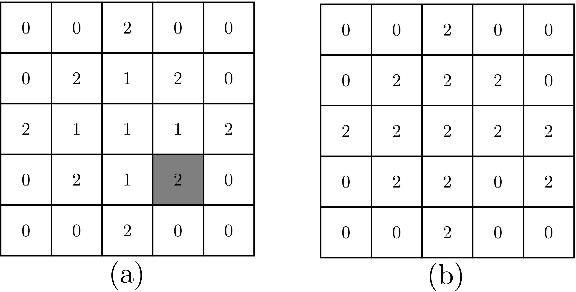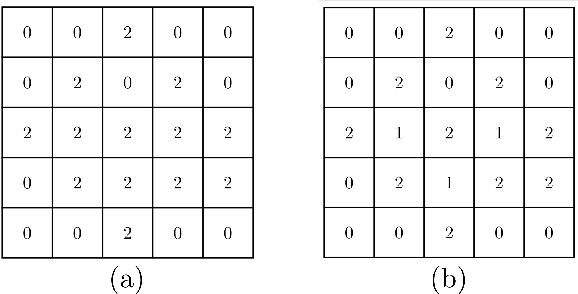Sheryl Hsu
FSPO: Few-Shot Preference Optimization of Synthetic Preference Data in LLMs Elicits Effective Personalization to Real Users
Feb 26, 2025Abstract:Effective personalization of LLMs is critical for a broad range of user-interfacing applications such as virtual assistants and content curation. Inspired by the strong in-context learning capabilities of LLMs, we propose Few-Shot Preference Optimization (FSPO), which reframes reward modeling as a meta-learning problem. Under this framework, an LLM learns to quickly adapt to a user via a few labeled preferences from that user, constructing a personalized reward function for them. Additionally, since real-world preference data is scarce and challenging to collect at scale, we propose careful design choices to construct synthetic preference datasets for personalization, generating over 1M synthetic personalized preferences using publicly available LLMs. In particular, to successfully transfer from synthetic data to real users, we find it crucial for the data to exhibit both high diversity and coherent, self-consistent structure. We evaluate FSPO on personalized open-ended generation for up to 1,500 synthetic users across across three domains: movie reviews, pedagogical adaptation based on educational background, and general question answering, along with a controlled human study. Overall, FSPO achieves an 87% Alpaca Eval winrate on average in generating responses that are personalized to synthetic users and a 72% winrate with real human users in open-ended question answering.
Grounding by Trying: LLMs with Reinforcement Learning-Enhanced Retrieval
Oct 31, 2024Abstract:The hallucinations of large language models (LLMs) are increasingly mitigated by allowing LLMs to search for information and to ground their answers in real sources. Unfortunately, LLMs often struggle with posing the right search queries, especially when dealing with complex or otherwise indirect topics. Observing that LLMs can learn to search for relevant facts by $\textit{trying}$ different queries and learning to up-weight queries that successfully produce relevant results, we introduce $\underline{Le}$arning to $\underline{Re}$trieve by $\underline{T}$rying (LeReT), a reinforcement learning framework that explores search queries and uses preference-based optimization to improve their quality. LeReT can improve the absolute retrieval accuracy by up to 29% and the downstream generator evaluations by 17%. The simplicity and flexibility of LeReT allows it to be applied to arbitrary off-the-shelf retrievers and makes it a promising technique for improving general LLM pipelines. Project website: http://sherylhsu.com/LeReT/.
RLVF: Learning from Verbal Feedback without Overgeneralization
Feb 16, 2024



Abstract:The diversity of contexts in which large language models (LLMs) are deployed requires the ability to modify or customize default model behaviors to incorporate nuanced requirements and preferences. A convenient interface to specify such model adjustments is high-level verbal feedback, such as "Don't use emojis when drafting emails to my boss." However, while writing high-level feedback is far simpler than collecting annotations for reinforcement learning from human feedback (RLHF), we find that simply prompting a model with such feedback leads to overgeneralization of the feedback to contexts where it is not relevant. We study the problem of incorporating verbal feedback without such overgeneralization, inspiring a new method Contextualized Critiques with Constrained Preference Optimization (C3PO). C3PO uses a piece of high-level feedback to generate a small synthetic preference dataset specifying how the feedback should (and should not) be applied. It then fine-tunes the model in accordance with the synthetic preference data while minimizing the divergence from the original model for prompts where the feedback does not apply. Our experimental results indicate that our approach effectively applies verbal feedback to relevant scenarios while preserving existing behaviors for other contexts. For both human- and GPT-4-generated high-level feedback, C3PO effectively adheres to the given feedback comparably to in-context baselines while reducing overgeneralization by 30%.
The Power of Many: A Physarum Swarm Steiner Tree Algorithm
Oct 15, 2021



Abstract:We create a novel Physarum Steiner algorithm designed to solve the Euclidean Steiner tree problem. Physarum is a unicellular slime mold with the ability to form networks and fuse with other Physarum organisms. We use the simplicity and fusion of Physarum to create large swarms which independently operate to solve the Steiner problem. The Physarum Steiner tree algorithm then utilizes a swarm of Physarum organisms which gradually find terminals and fuse with each other, sharing intelligence. The algorithm is also highly capable of solving the obstacle avoidance Steiner tree problem and is a strong alternative to the current leading algorithm. The algorithm is of particular interest due to its novel approach, rectilinear properties, and ability to run on varying shapes and topological surfaces.
 Add to Chrome
Add to Chrome Add to Firefox
Add to Firefox Add to Edge
Add to Edge